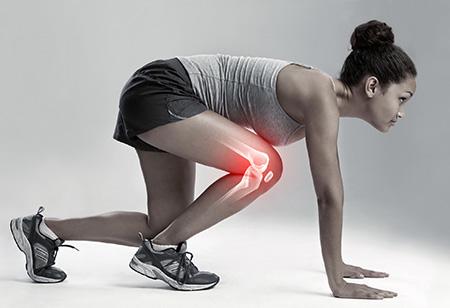Here's a quick look at tissue types and how they work together:
- Your joints are the connection points between two bones where the bones can move in relation to one another. There are several types of joints. A common one is the hinge type found in the elbow or fingers. Another is the ball-and-socket joint found in the hip and shoulder.
- To allow the bones to move smoothly against one another at a joint, the bones on each side of a joint are shaped to move over the other. “In the hip, the ball fits perfectly into the socket,” said Dr. Seidel. “Since the bones are hard surfaces, the end of each bone is covered by a smooth tissue cushion called cartilage. You might recognize cartilage as the white, shiny tissue on the end of a chicken bone. In addition, inside the joint is a fluid called synovial fluid, which acts to lubricate the cartilage and keep the joint moving smoothly.”
- The joint and fluid are surrounded by a tissue capsule, which is something like a water balloon around the joint to seal in the fluid.
- Ligaments, strands of tough fibrous tissue between the bones of the joint, keep joint movement stable and controlled.
- Muscles between the joints contract and pull on the tendon ends of the muscles, which are attached to the bones near the joints and power joint movement.
Why joints crack
Joints can and do make noises. You might hear your knuckles crack, your knees pop when you stand up or your neck make noise when you turn your head.
“We don’t know for sure what makes joints crack or pop,” said Dr. Seidel. “One theory is there is a tiny bubble of gas produced during range of motion and as the bubble moves through the joint it makes the sound. Another theory is that the lining of the joint may snap as the joint is moved, especially at the ends of the range of motion. We are fairly certain that the noise is not produced from a problem in the joint or from joint damage.”
This type of noise may be a little disconcerting, but it's nothing to worry about and hasn't been shown to cause arthritis or other joint problems.
When to worry
Other joint noises may signal potential problems:
- A grinding or grating noise, called crepitus, can indicate arthritis.
“Arthritis is the process of the soft cushion of cartilage wearing down,” said Dr. Seidel. “Initially, the cartilage becomes rough like a cobblestone street. As the arthritic process continues, the cartilage can wear away completely and at that point is referred to as bone-on-bone arthritis. Both the rough cartilage and the rough ends of the bone make a grinding or grating noise as the joint moves. The noise itself is not a problem but just a symptom of the arthritis.” - Sometimes tendons near joints can rub over bony prominences.
- The small lubricating sacs of fluid around joints, called bursa, can become inflamed and cause rubbing or snapping sounds.
If sounds emerging from joints aren't causing any pain, loss of motion, swelling or weakness, they're probably not serious. But if any of these symptoms accompany your joint sounds, you should check with your primary care physician or an orthopedic surgeon. Your doctor will evaluate your joints by reviewing your health history, performing a physical exam and getting an X-ray of the involved joints.
Often, the symptoms of arthritis are treated with non-surgical care. Your orthopedic surgeon may prescribe physical therapy or perform joint injections to help reduce the inflammation or lubricate the joint. You may also be recommended to start a joint health supplement. Your orthopedic surgeon will likely discuss all these options with you after a full evaluation.

